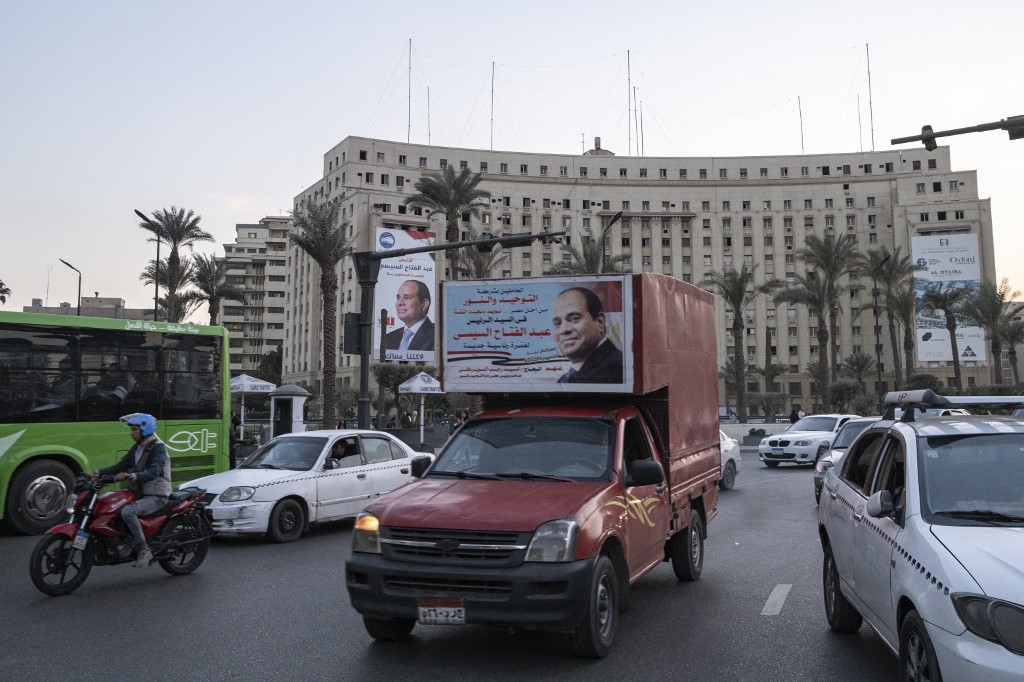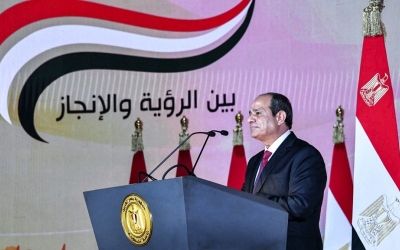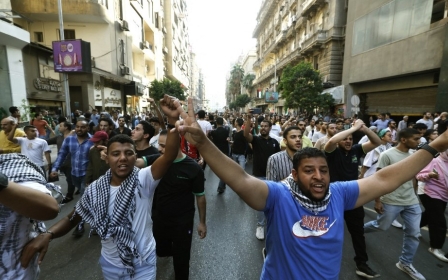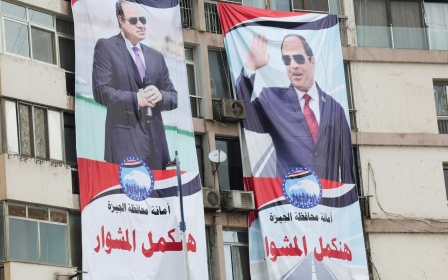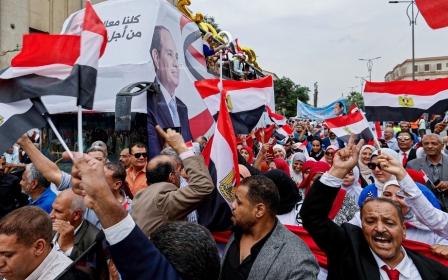Egypt elections: Streets flooded with pro-Sisi signs as people forced to endorse president
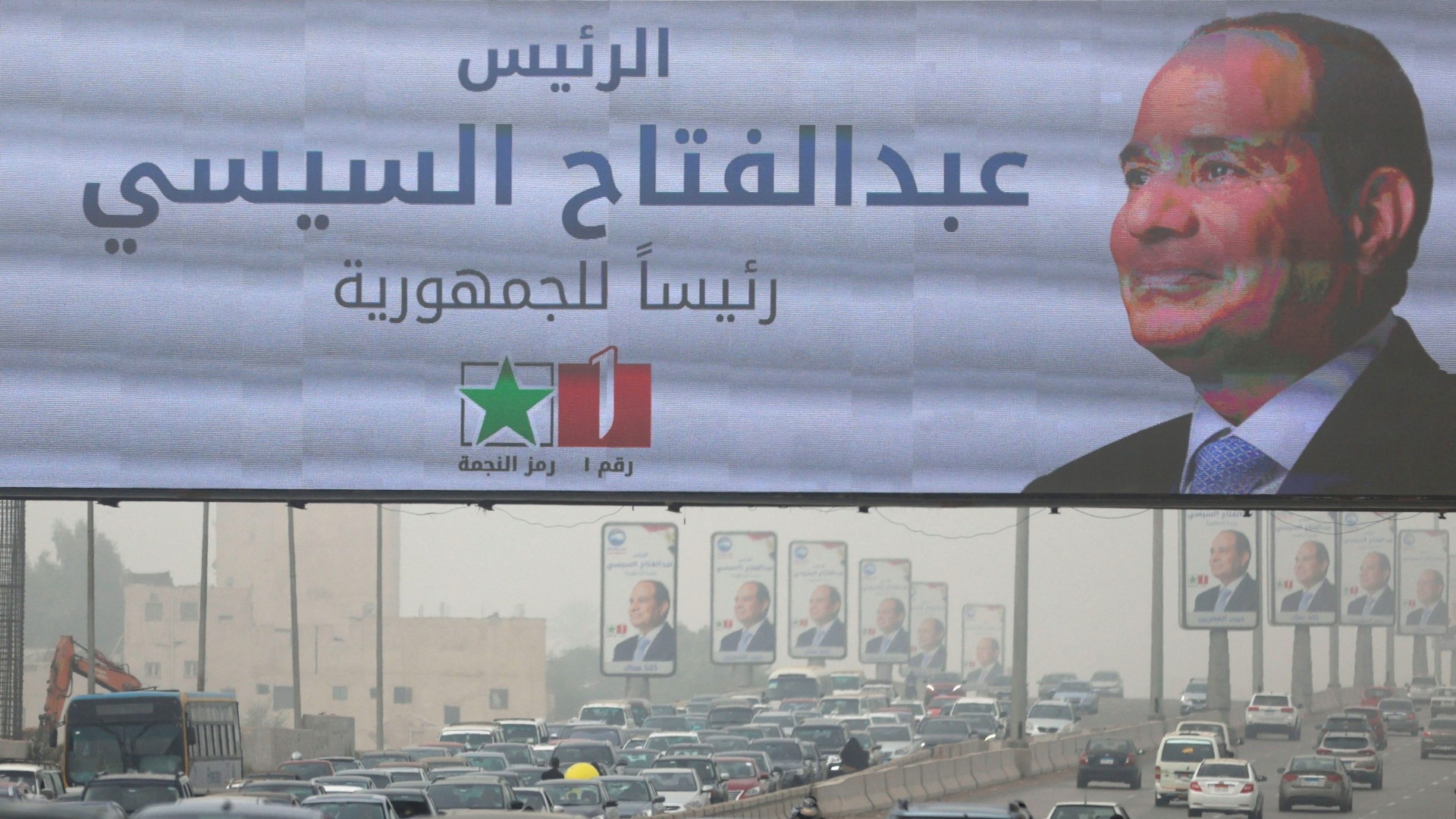
Strolling through the streets of Cairo, the only noticeable sign of an impending election is the proliferation of support materials for incumbent president and candidate Abdel Fattah el-Sisi.
These range from double-sided LED street banners to cloth signs and printed posters.
Despite the absence of genuine competition and a lack of substantial political discourse or debates among candidates, most of whom are unfamiliar to the majority of Egyptians, Sisi is anticipated to win by a landslide in the upcoming election scheduled for 10-12 December.
The 69-year-old former army general first became president in 2014, after ousting his democratically elected predecessor Mohamed Morsi in a coup. He was subsequently re-elected in 2018 in an election marred by the detention or exclusion of all viable candidates.
This time, according to two official state sources who spoke to Middle East Eye on condition of anonymity, the primary concern among officials lies not in the competition itself, but rather in the potential for low voter turnout and apprehensions that the election may be perceived as a foregone conclusion.
Sisi is running against three candidates: Wafd Party leader Abdel Sanad Yamama, Egyptian Social Democratic Party leader Farid Zahran, and Republican People Party leader Hazem Omar. None of these candidates have support among the youth or popularity in the streets.
Leftist politician Ahmed Tantawy, who was backed by Sisi's opposition, withdrew from the presidential race last month citing major violations against him and his campaign members. His exit from the race has added to the disillusionment among the country's youth.
Tantawy and dozens of his campaign members are currently under trial for fraud, a charge many view as an act of reprisal for their challenging of Sisi.
Despite the lack of election rivals, the Sisi government has intimidated business owners to display support for the incumbent president, according to sources who spoke to MEE in different areas across the country.
Owners of small and medium-sized businesses in three cities told MEE they were visited by “security officers'' who mandated the printing of support banners, their display in main squares, and the mobilisation of voters on election days.
Hamdy, a 41-year-old manager of a barbecued chicken restaurant in the working-class neighbourhood of Matariya East of Cairo, told MEE that he experienced a similar visit. "I had to put up three banners, two in the main square and one in front of the shop. Each costs 1000 EGP [$32]."
Hamdy recognised the National Security officers from the Matariya police station. He explained, "They came to eat chicken free as usual, and all their instructions had 'or else' in it. Plus I have to give 50 meals to voters each day."
He revealed that they threatened him with fines or cutting off the store's electricity. "All the [shops] in the area have to do the same. The bigger your business is, the bigger the number of banners you have to give for free," Hamdy added.
'The great banner race'
In downtown Cairo, particularly in the Ramses area outside the Cairo central train station, buildings are nearly obscured by the multitude of banners.
The banners are arranged in columns, connected by rope and large wooden sticks. Business owners in this neighbourhood not only have to purchase the banners but also have to rent space to hang them.
"Most of the small shops pay rent and are not owners. Buying the banners and renting space can cost around 8000 EGP," explained Hammad, a manager of a mobile repair shop, adding that it's a substantial amount but considered an investment to avoid police harassment or investigations.
Forcing business owners to invest in campaign activities is not a novel strategy for the Egyptian state, dating back to the era of the deposed late President Hosni Mubarak. This practice has seen a resurgence since President Sisi and the military assumed control of the government in 2013.
In a similar vein to Hamdy's experience, Samir, a co-owner of a microbus dealership store in Assiut, southern Egypt, was compelled to contribute by providing buses to transport voters for free, in addition to displaying support banners.
"Plainclothes officers, along with Nation’s Future Party parliament member Ahmed Hussien Gouda, visited our shop to convince me and my partners," he recounted to MEE.
The Nation’s Future Party (NFP) is the largest in parliament and the main backer of the Sisi government.
Samir and his staff are required to deliver the buses to the headquarters of the NFP for three days to ferry voters to the ballot boxes. "If I had the choice, I would never have spent a single Egyptian pound on Sisi and his corruption. But I have to take care of the business and the future of my children and wife," added Samir.
'If I had the choice, I would never have spent a single Egyptian pound on Sisi and his corruption'
- Samir, microbus dealership co-owner
The escalating number of banners even drew criticism from pro-military TV presenter Khaled Abu Bakr, who remarked on the state-owned TV station ON TV, "We are now banners that have streets. This is the Great Banner Race. How about collecting the money for the banners and helping the poor?"
Abu Bakr attempted to attribute the abundance of banners to "state supporters".
However, NFP parliament member Gouda denied any involvement in meetings that forced or encouraged businesses to spend money on campaigning.
"All these banners you are seeing are people's love and support for the president," Gouda told MEE, adding, "Yes, there will be businesses at all the Nation’s Future Party headquarters to assist voters."
"I challenge anyone to go on record to say they were forced to donate a single pound."
'No one really cares'
In Alexandria, influential families like that of Al-Badawi Ali Amin are orchestrating large-scale rallies and mobilising individuals by promising women and young men 200 EGP and two meals if they gather in front of designated polling stations after casting their votes.
The family, known for its support of Mubarak in the 1990s, already has members who are elected parliamentarians with the NFP.
'There is no hope for any change or improvement in the status of people in this country. The poor will remain poor'
- Om Omnia, cleaner
Amid a severe economic crisis in the country and a staggering inflation rate of 40 percent, young people are seizing these opportunities to earn extra income.
Awad, an 18-year-old computer science major in Alexandria, said that he was invited to one such gathering and was promised higher pay if he brought friends. "No one really cares about the elections. We did the same in September when they asked us to sign the endorsement petition.
"They want young people to be there and make noise so the TV [press] can take a video. It's an easy gig."
Meanwhile, Om Omnia, a 51-year-old cleaner in a kindergarten, said she received a call from her Takaful and Karama social worker instructing her to vote on Sunday, or her monthly pension will be withheld for December.
MEE has previously reported that the Sisi campaign forced beneficiaries of Takaful and Karama, the government's flagship cash support scheme for the poor, to sign nomination petitions for the incumbent president prior to his official candidacy announcement.
“There is no hope for any change or improvement in the status of people in this country. The poor will remain poor, and no one will ask about them."
Middle East Eye propose une couverture et une analyse indépendantes et incomparables du Moyen-Orient, de l’Afrique du Nord et d’autres régions du monde. Pour en savoir plus sur la reprise de ce contenu et les frais qui s’appliquent, veuillez remplir ce formulaire [en anglais]. Pour en savoir plus sur MEE, cliquez ici [en anglais].


